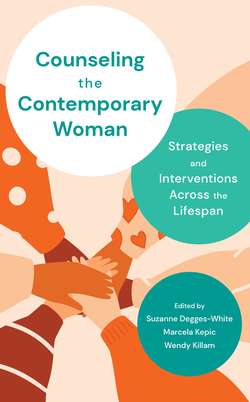Читать книгу Counseling the Contemporary Woman - Suzanne Degges-White - Страница 76
На сайте Литреса книга снята с продажи.
Case Vignette: Agneshka
ОглавлениеAgneshka is a twenty-four-year-old white female born to Polish immigrant parents who have been divorced for the past fifteen years. She lives with her father, stepmother, and two younger half siblings. She is a fourth-year college student and the first in her family to go to college. Agneshka is studying nutrition; unfortunately, her parents are not supportive of her academic major and are pushing her to pursue medical school. She is an honor student, but she does not believe she can handle medicine. Currently, Agneshka and her stepmother have been experiencing significant conflict and frequent arguments. Agneshka isn’t as helpful with her younger siblings or housekeeping as her stepmother would like her to be. Agneshka’s father only steps in if an argument is growing intense, and then he tends to take the side of his wife. This leaves Agneshka feeling very much alone, and she is contemplating a move out of her father’s home. She works part-time as a waitress to cover the expenses related to her car, and she is considering taking on more shifts in order to save money for a place of her own.
Agneshka is currently dating a thirty-three-year-old Polish divorced father with two young children who live with him. Agneshka loves to spend time with him but is disappointed that he has so little time available to spend with her. She finds herself helping him around the house but does not feel like she spends quality time with him. Similar to the dynamics between Agneshka and her stepmother, she and her boyfriend argue a lot over housework and other random issues. Overwhelmed and undecided about what she will do with her college major, what she will do with her home situation, and what she will do with her “not so happy” relationship, Agneshka reaches out for assistance from a counselor.
* * *
Arnett (2000) offered a developmental perspective on emerging adulthood (roughly spanning from eighteen to twenty-five years of age) and posited that the period is conceptually distinct from both adolescence and young adulthood. Role balance during this time frame is important. There has been an interdependent relationship found between residence, finances, and romance where when greater responsibility is assumed in one area it occurs in other areas as well (Bishop, Welsh, Lounsbury, & Norona, 2016). While many associate Erickson’s theory as focusing on sexual development during this time frame, the focus on psychosocial intimacy is also about building deeper and more meaningful relationships with peers that are not necessarily of a sexual nature (Weisskirch, 2018). Traditionally, mate selection and relationship satisfaction are prioritized developmental tasks; however, changes in educational paths, jobs, or living situation occur as well, for many emerging adults (Arnett, 2006). Developing one’s identity and attending to various areas of life can be a bit overwhelming, yet these challenges can help with overall identity development and growth. There are also areas within physical development that occur during this time frame.
